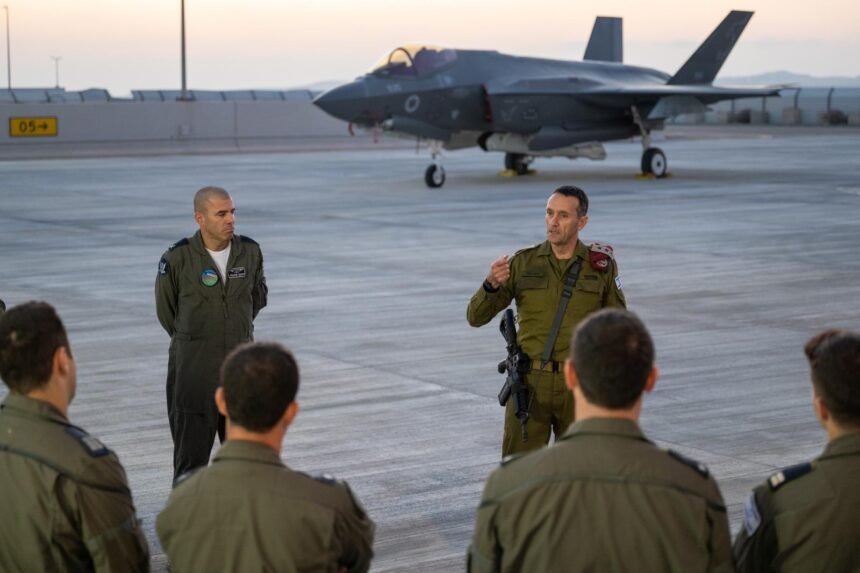What Sparked Israel’s Recent Military Response?
Tensions between Israel and Iran have been mounting for months, and the situation reached a boiling point earlier this month. Tehran launched around 200 ballistic missiles towards Israel,
marking its second major missile strike on the country in just half a year. With the safety of its citizens under threat,
Israel could no longer remain passive. The attack on October 1, 2024, made it clear that a firm response was necessary.
This escalation has kept Israel at the forefront of international news and sparked intense debates about security and defense in the Middle East.
IDF’s Official Statement: Operation ‘Days of Repentance’
On Saturday, the IDF issued an official statement confirming the successful conclusion of the operation, which had been dubbed “Days of Repentance.”
According to the IDF, the operation achieved all its objectives, and remarkably, no Israeli aircraft were lost. This marked a resounding success for the Israeli military,
not just in terms of military targets hit but also in ensuring the safety of its personnel.
This news has made headlines in both Israel and international media, including prominent outlets like the BBC News and the Times of Israel.
What Were the Key Targets of Israel’s Retaliation?
The IDF’s retaliation targeted two critical military areas within Iran:
Missile Manufacturing Facilities
The first priority was to neutralize Iran’s missile manufacturing sites. These facilities were believed to be responsible for producing the ballistic missiles that had been launched towards Israel. By targeting these factories, Israel aimed to weaken Iran’s missile capabilities and prevent further strikes on its territory.
Surface-to-Air Missile Systems
The second target was Iran’s surface-to-air missile arrays, which had been set up to challenge Israel’s air superiority. By neutralizing these systems, Israel ensured that it could maintain its freedom to conduct air operations over hostile regions without interference. This strategic move was designed to cripple Iran’s ability to defend its skies against Israeli airstrikes.
Tensions in the Region: West Asia on High Alert
The entire West Asian region has been on edge following Israel’s military response. Given the scale and intensity of Iran’s missile attack, there had been widespread speculation about Israel’s next move.
While the timing and scale of the retaliation were unclear, the IDF’s statement confirmed that Israel had acted swiftly and decisively.
This development has drawn significant attention from global media, with news outlets like BBC and the Tehran Times extensively covering the situation.
Israel’s Justification for the Strikes
Israel has made it clear that it has both the right and the duty to protect its citizens. The operation against Iran was a direct response to the ongoing missile attacks, and Israel’s stance remains firm: any threats to its security will met with proportional force. The IDF actions were see as an extension of this policy,
aiming to deliver a clear message to Iran and the international community alike: Israel will not tolerate aggression, and it will take whatever measures necessary to defend itself.
The October 1 Attack: A Line in the Sand
The recent operation the IDF was spurred Iran missile assault on October 1, 2024, which saw around 200 ballistic missiles fired towards Israeli targets.
While this was not the first time Iran had launch such an attack, it was significant because it mark the second major missile strike on Israel in less than six months. For Israel, this marked a tipping point, prompting a swift and decisive response.
The attack has widely covered in both Israeli and international news outlets, sparking discussions about the ongoing cycle of violence between the two nations.
The Symbolism Behind ‘Days of Repentance’
The operation’s name, “Days of Repentance,” is load with symbolism. It reflects a period of reflection and, ultimately, action. By choosing this name,
Israel sought to convey a message not only to Iran but also to the global community: Israel will act decisively when provoked but with careful strategy and purpose.
This operation has highlighted Israel’s readiness to defend itself and has captured the attention of international media, particularly in Israel news outlets and the Tehran Times.
How Did Tehran React?
As expected, Iran condemned Israel’s military actions, labeling them as unwarranted acts of aggression. However, the response from the international community has been more varied. While some critics argue that Israel’s actions could escalate the conflict further, others view the strikes as a necessary measure of self-defense.
The geopolitical balance in the region is always precarious, and incidents like this further complicate an already volatile situation. Tehran’s reaction has been a key subject of discussion in news outlets like the Tehran Times,
which has provided a platform for the Iranian government’s perspective on the conflict.
The Role of Proxies in the Israel-Iran Conflict
The Israel-Iran conflict is far more complicated than a simple bilateral dispute. Iran’s influence extends through a network of allie groups and proxies across the region, many of which are actively involve in undermining Israeli security. From Hezbollah in Lebanon to various militias in Syria and Iraq,
Iran’s proxies form a critical part of its strategy against Israel. This broader web of alliances makes Israel’s position even more precarious, as any escalation with Iran could trigger a broader regional conflict.
The role of these proxies is a significant factor in the Israel-Iran tensions and is often highlight in coverage of the conflict.
Israel’s Preemptive Doctrine: A Strategy for Survival
IDF has long emphasized the need for preemptive strikes. Given its geographic location and the hostile environment in which it exists, Israel has frequently found itself in situations where waiting for an attack could be disastrous.
When Tehran arms its proxies or launches direct assaults, Israel views preemptive action as vital for its survival. This approach has shaped Israel’s military strategies and continues to influence its responses to provocations from Iran and its allies.
The idea of striking first to neutralize a threat is a central tenet of Israel’s defense strategy, often discussed in both Israeli and global media.
What’s Next? The Future of Israel-Iran Relations
With the conclusion of this operation, one might wonder whether this marks the end of hostilities between Israel and Iran. Unfortunately, the answer is more complicated. Both nations are likely to reassess their next steps, and the region will likely remain on high alert.
Israel has made it clear that it will not tolerate further aggression, while Iran, too, will likely continue to strengthen its positions in the region.
While the operation has temporarily eased some immediate threats, the broader geopolitical tension remains unresolved. The question now is whether this incident will lead to further escalation or, conversely,
whether it might push both sides to reconsider their strategies.
The Future of the Israel-Iran Conflict
It is impossible to predict the future of Israel-Iran relations with certainty. The animosity between the two nations has deep historical roots, and as such,
any hope for a peaceful resolution seems distant. However,
incidents like this remind the world of the importance of dialogue and diplomacy.
The risk of further escalation is real, and both nations have much to lose if the conflict intensifies. As Israel and Iran continue their geopolitical maneuvering,
the rest of the world watches, hoping for a shift toward de-escalation and diplomacy.
Read More: Ind A vs Afg A : The Showdown in Emerging Asia Cup 2024
Conclusion
The latest military operation by the IDF highlights the fragile and volatile nature of the Israel-Iran conflict. While the mission may have neutralized some immediate threats, the underlying tensions are far from resolved. As both nations continue their strategic moves, the hope is that cooler heads will prevail,
and further confrontation can avoide. The stakes remain high, not just for Israel and Iran, but for the broader region and the international community.
In the end, the Israel-Iran conflict is about much more than military power. It’s a battle for survival, influence, and control in a region rife with geopolitical tension.
Only time will tell whether this recent operation will be the last of its kind, or if it’s just the beginning of a new chapter in an ongoing saga.










